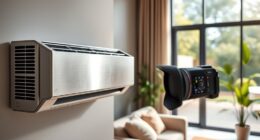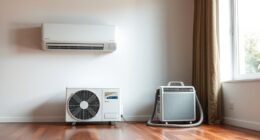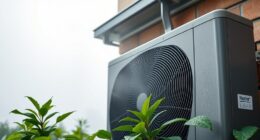We’ve heard the rumors and it’s time to clear things up. When it comes to the efficiency of AC heat pumps, there are many misconceptions out there. But don’t worry, we’re here to dispel them all.
In this article, we’ll delve into the truth behind common myths, shed light on SEER ratings, and explore how climate affects efficiency.
So, sit back, relax, and let us serve you the facts on AC heat pump efficiency.
Key Takeaways
- AC heat pump efficiency is affected by factors such as temperature difference, equipment size and quality, and regular maintenance.
- SEER ratings help in selecting heat pumps with higher energy efficiency and potential energy savings.
- Heat pumps are highly efficient as they transfer heat instead of generating it, and can provide efficient heating even in cold temperatures.
- Climate, including altitude and humidity, directly impacts the efficiency and performance of heat pump systems.
The Basics of AC Heat Pump Efficiency
We can achieve optimal efficiency in our AC heat pump by understanding the basics of how it operates and by properly maintaining it. To calculate the efficiency of an AC heat pump, we use a simple formula: Efficiency = (Heat output / Energy input) x 100. This calculation allows us to determine how effectively the heat pump converts energy into heat.
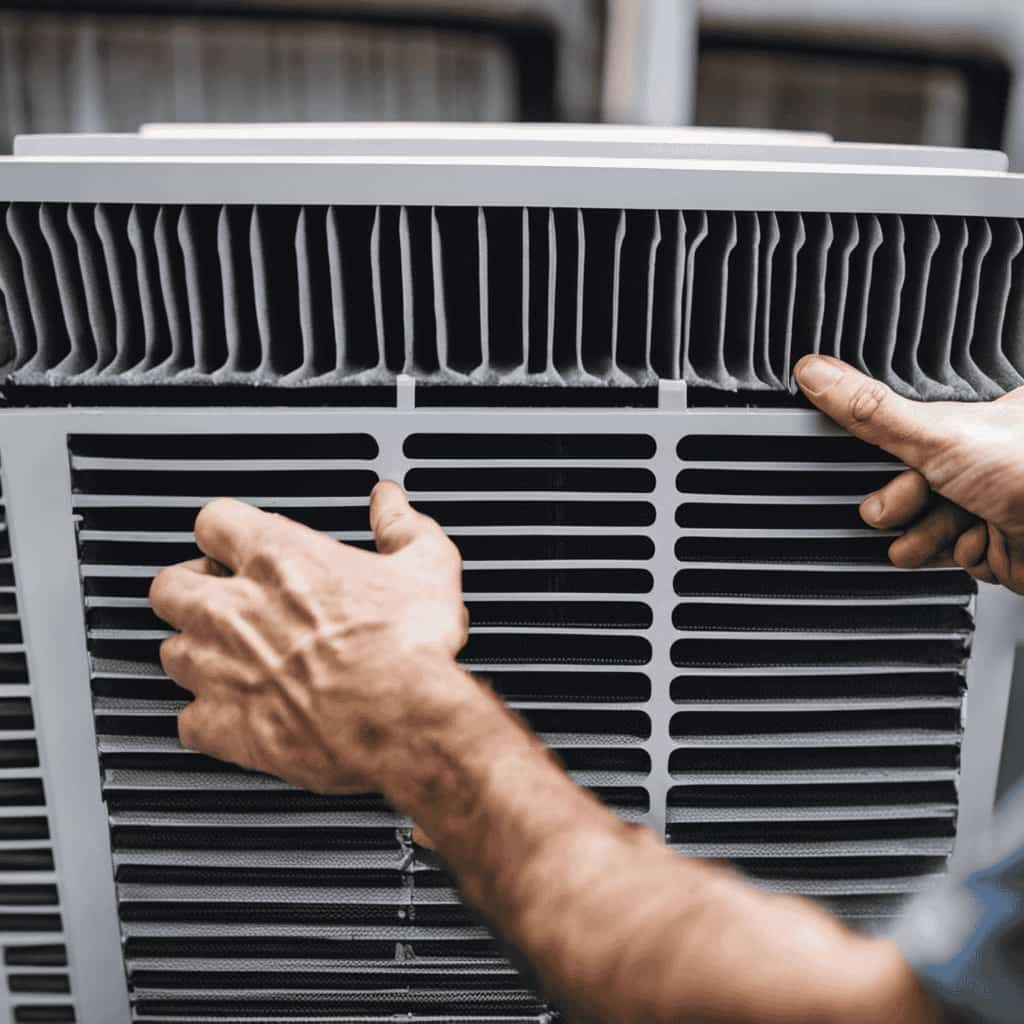
However, several factors can affect the efficiency of an AC heat pump. The first factor is the temperature difference between the inside and outside of the building. The larger the temperature difference, the harder the heat pump has to work, resulting in decreased efficiency.
Another factor is the size and quality of the equipment. Proper sizing and high-quality components contribute to better efficiency. Additionally, regular maintenance, such as cleaning the filters and checking refrigerant levels, can ensure that the heat pump operates at its highest efficiency.
Understanding SEER Ratings for Heat Pumps
To understand the efficiency of heat pumps, it’s important for us to grasp the significance of SEER ratings and how they’re calculated. SEER stands for Seasonal Energy Efficiency Ratio, which is a measurement of the cooling output of a heat pump divided by the energy it consumes over an entire cooling season.
Here are four key points to understand about SEER ratings:

- SEER ratings are determined by standardized testing procedures that simulate different climatic conditions.
- The higher the SEER rating, the more energy efficient the heat pump is, resulting in potential energy savings.
- Heat pump technology has advanced significantly, allowing for higher SEER ratings and greater energy-saving benefits.
- It’s important to consider SEER ratings when selecting a heat pump, as higher ratings can lead to lower energy bills and reduced environmental impact.
Understanding SEER ratings helps consumers make informed decisions about heat pump efficiency and the energy-saving benefits they can expect.
Now, let’s address some common myths about heat pump efficiency.
Common Myths About Heat Pump Efficiency
Let’s debunk some common myths about heat pump efficiency.
One misconception is that heat pumps aren’t as efficient as traditional heating systems. However, heat pumps are actually highly efficient because they transfer heat from one location to another instead of generating heat. They can achieve efficiencies of over 300%, meaning that for every unit of electricity they consume, they can produce more than three units of heat.

Another myth is that heat pumps are only effective in warmer climates. In reality, heat pumps can provide efficient heating even in cold temperatures, thanks to advancements in technology.
Additionally, some people believe that heat pumps are expensive to operate. However, the benefits of heat pump efficiency, such as reduced energy consumption and lower utility bills, outweigh the initial investment.
Exploring the Differences Between Cooling and Heating Efficiency
One important distinction to understand is that cooling efficiency and heating efficiency are measured and evaluated differently. When it comes to heat pump systems, the performance of the system can be affected by several factors. Here are four key factors that can impact the cooling vs heating performance of a heat pump:
-
Outdoor temperature: Heat pumps rely on the outdoor air to extract heat during the heating mode and release heat during the cooling mode. As the outdoor temperature drops, the efficiency of the system decreases.

-
Indoor temperature: The desired indoor temperature can also affect the efficiency of a heat pump. The greater the difference between the desired indoor temperature and the outdoor temperature, the harder the heat pump has to work.
-
Insulation: The level of insulation in a building plays a significant role in heat pump efficiency. Well-insulated spaces require less energy to maintain the desired temperature, resulting in improved efficiency.
-
System maintenance: Regular maintenance, such as cleaning filters and checking refrigerant levels, is crucial for optimal heat pump performance. Neglecting maintenance can lead to reduced efficiency and higher energy consumption.
Understanding the differences between cooling and heating efficiency, as well as the factors that affect heat pump performance, is essential for ensuring optimal energy efficiency and comfort in your home or building.

How Climate Affects Heat Pump Efficiency
The climate directly impacts the efficiency of our heat pump system. Two key factors that affect heat pump efficiency are altitude and humidity.
At higher altitudes, the air is thinner, which means there’s less heat energy available for the heat pump to extract. This can result in decreased efficiency and reduced heating or cooling performance.
Additionally, humidity levels can also impact heat pump performance. In humid climates, the heat pump has to work harder to remove moisture from the air, which can decrease its overall efficiency. Higher humidity levels can also reduce the heat pump’s ability to effectively cool or heat a space.
Therefore, it’s important to consider both altitude and humidity when evaluating the efficiency of a heat pump system in different climates.

The Role of Proper Installation in Maximizing Efficiency
By ensuring that our heat pump system is properly installed and maintained, we can maximize its efficiency and performance.
Proper installation plays a crucial role in achieving optimal energy consumption and reducing operational costs. Here are four key factors to consider:
-
Correct Sizing: A properly sized heat pump ensures that it can effectively heat or cool your space without wasting energy. An undersized unit may struggle to meet your comfort needs, while an oversized one can lead to short cycling and reduced efficiency.
-
Ductwork Design: Properly designed and sealed ductwork minimizes air leaks and ensures efficient airflow throughout your home. Leaky ducts can lead to energy loss and reduced performance.

-
Refrigerant Charge: Correct refrigerant levels are essential for efficient heat pump operation. Improper charging can result in reduced efficiency, increased energy consumption, and potential damage to the system.
-
Airflow Optimization: Proper airflow is necessary for optimal heat pump performance. Regularly clean or replace air filters, ensure proper ventilation, and keep the outdoor unit clear of debris to maintain adequate airflow.
Energy-Saving Tips for Optimizing Heat Pump Efficiency
When it comes to optimizing heat pump efficiency, there are two key points to consider.
First, temperature setting recommendations can play a significant role in energy savings. By adjusting the thermostat to a slightly lower temperature in winter and a slightly higher temperature in summer, you can reduce the workload on your heat pump and save on energy costs.

Second, regular maintenance is crucial for maximizing efficiency. Simple tasks like cleaning or replacing air filters, keeping the outdoor unit clear of debris, and scheduling professional inspections can ensure that your heat pump operates at its peak performance, saving you money in the long run.
Temperature Setting Recommendations
To maximize heat pump efficiency, we recommend setting your temperature within a range of 68 to 72 degrees Fahrenheit. This temperature range strikes a balance between comfort and energy consumption.
Here are four reasons why this temperature setting is ideal for optimizing heat pump efficiency:
-
Energy Savings: Setting your temperature within this range allows your heat pump to operate at its most efficient level, reducing energy consumption and lowering your utility bills.

-
Comfortable Environment: This temperature range provides a comfortable indoor environment, ensuring that you and your family can enjoy a cozy atmosphere without sacrificing efficiency.
-
Reduced Strain on the System: Operating your heat pump within this range prevents excessive cycling, which can put unnecessary strain on the system and lead to increased wear and tear.
-
Consistent Performance: By maintaining a consistent temperature within this range, your heat pump can operate more efficiently and deliver reliable performance throughout the day.
Regular Maintenance Importance
For optimal heat pump efficiency, we recommend regularly maintaining your system and implementing energy-saving tips. Regular maintenance is crucial for the proper functioning of your AC heat pump and can help you identify and address any inefficiencies.

Here are some regular maintenance tips to ensure your heat pump operates at its best.
First, clean or replace the air filters every one to three months to prevent airflow restrictions and improve air quality.
Second, check and clean the outdoor unit regularly to remove debris and ensure proper airflow.
Third, schedule professional maintenance at least once a year to inspect and tune up your heat pump.

Debunking Misconceptions About Energy Efficiency Rebates and Incentives
We debunk the misconception that energy efficiency rebates and incentives are ineffective. In fact, these programs can be highly beneficial for both homeowners and businesses. Here are four key reasons why energy efficiency rebates and incentives shouldn’t be dismissed:
-
Cost savings: Rebates and incentives can significantly reduce the upfront costs of energy-efficient upgrades, such as installing solar panels or upgrading to energy-efficient appliances. This can lead to substantial long-term savings on energy bills.
-
Increased demand: By offering financial incentives, governments and utility companies encourage more individuals and businesses to invest in energy-efficient technologies. This increased demand can drive innovation, lower production costs, and ultimately make energy-efficient products more accessible to everyone.
-
Environmental impact: By promoting energy efficiency, rebates and incentives help reduce greenhouse gas emissions and combat climate change. By incentivizing energy-efficient upgrades, these programs contribute to a greener and more sustainable future.

-
Economic benefits: Energy efficiency programs stimulate local economies by creating jobs in the energy sector. From manufacturing energy-efficient products to conducting energy audits and installations, these programs provide employment opportunities and contribute to economic growth.
Frequently Asked Questions
Are Heat Pumps Only Efficient in Warm Climates?
Heat pumps are often associated with warm climates, but they can be efficient in cold climates too. In mild climates, heat pumps offer benefits such as energy savings and lower carbon emissions.
Can a Higher SEER Rating Guarantee Lower Energy Bills?
Higher SEER ratings do not guarantee lower energy bills. While higher SEER ratings indicate greater energy efficiency, actual savings depend on factors like climate, usage patterns, and maintenance.
Is It True That Heat Pumps Consume More Electricity Than Other Heating Systems?
Heat pump misconceptions often lead to the belief that they consume more electricity than other heating systems. However, the truth is that heat pumps are actually highly efficient and can significantly reduce energy consumption compared to traditional heating methods.
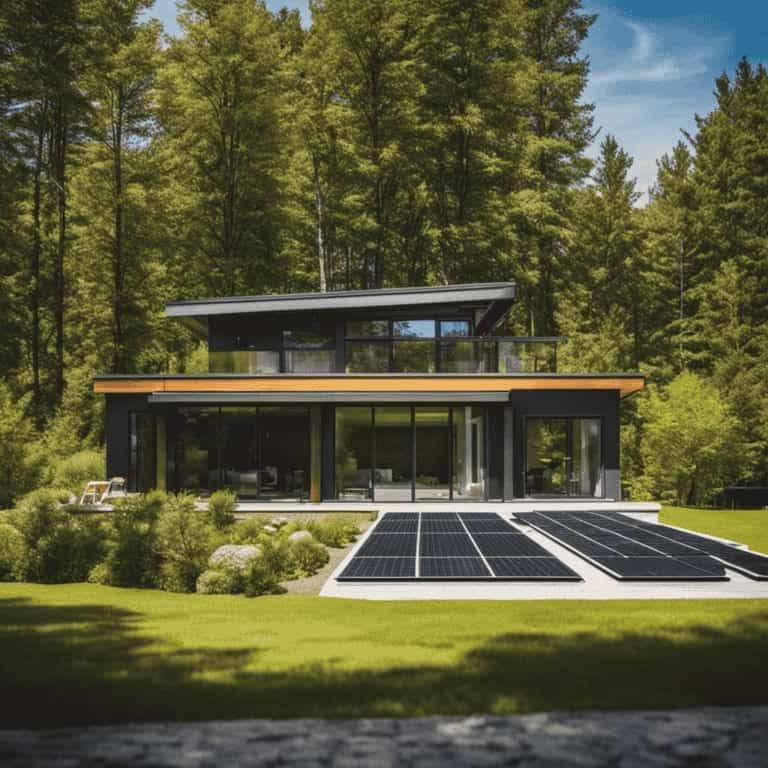
Do Heat Pumps Lose Efficiency Over Time?
Heat pumps can lose efficiency over time due to factors such as lack of heat pump maintenance, dirty filters, and refrigerant leaks. Regular maintenance and addressing these issues can help maintain optimal efficiency.
Are Energy-Efficient Heat Pumps More Expensive to Purchase and Install?
Energy-efficient heat pumps can be more expensive to purchase and install initially. However, they provide long-term cost effectiveness through reduced energy consumption. This makes them a wise investment for those seeking to save on utility bills and reduce their environmental impact.
Conclusion
In conclusion, understanding the truth about AC heat pump efficiency is like peeling back the layers of an onion.
It requires a careful examination of SEER ratings, debunking common myths, and considering the impact of climate and proper installation.

Just as an onion’s layers work together to create a delicious dish, optimizing heat pump efficiency involves a combination of factors.
With the right knowledge and energy-saving tips, you can unlock the full potential of your heat pump and enjoy a comfortable and cost-effective climate control solution.







